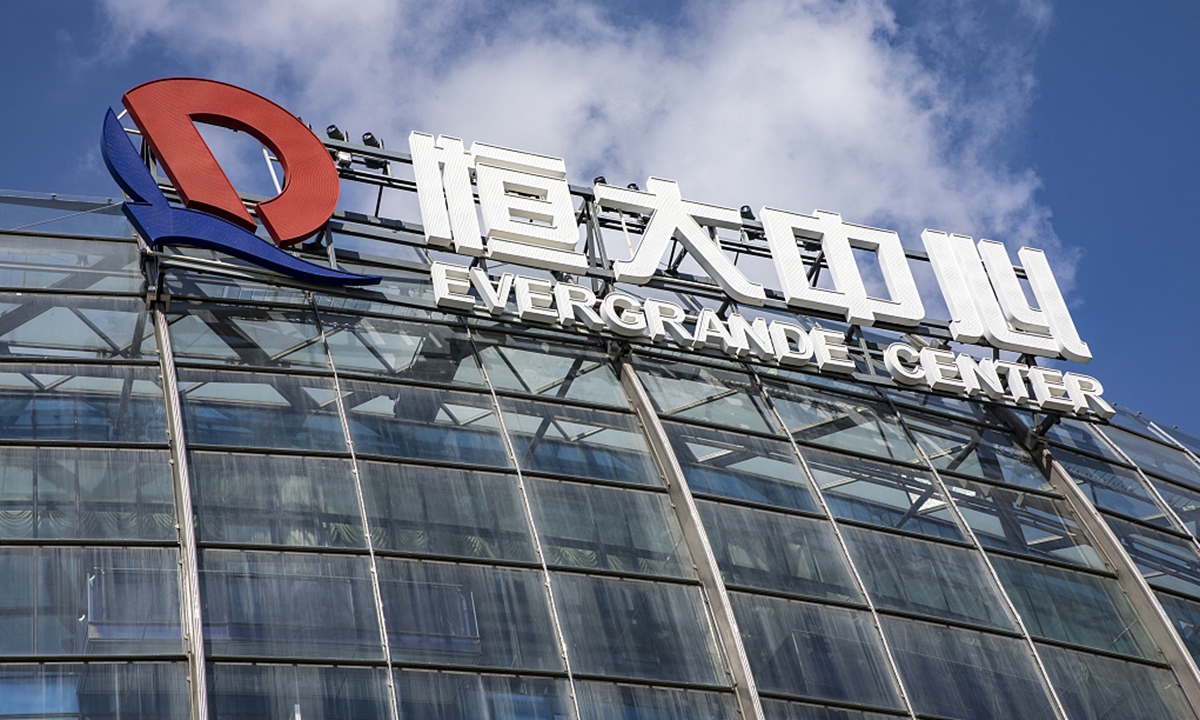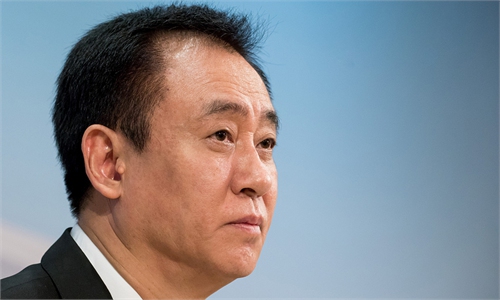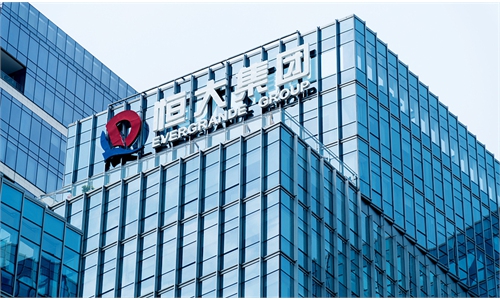China has more tools to contain risks from Evergrande’s woes: observer
Officials have more tools to avoid possible spillover effect: analysts

Evergrande. Photo: CFP
Chinese analysts on Sunday refuted some foreign media reports saying that the Evergrande Group's latest debt warnings and the country's move to rein in the real estate industry will greatly decelerate China's GDP growth, noting that the country is already acting to prevent a domino effect and it has more tools than some Western countries to deal with the issue of a single developer.
Over the weekend, Chinese regulators voiced support for real estate firms' reasonable debt issuance and financing, a sign that the months-long tight controls on real estate financing aiming to crack down on speculators may be temporarily relaxed, while also proving the central government's ability to prevent a spillover of Evergrande's situation on China's financial market, analysts said.
The remarks came as the Shenzhen-based property developer warned on Friday that it might fail to meet its financial obligations. Not long after the warning, the provincial government of South China's Guangdong summoned the heavily indebted Evergrande Group for talks and agreed to send a working group to the company to guide it in strengthening internal controls and management, and also in maintaining normal operations.
Later, three major Chinese financial regulators, in rare simultaneous statements, moved to reassure the markets that the Evergrande issue is an individual case and should not be a concern for the country's capital market or housing market.
Amid Evergrande's fresh warning, some foreign media speculated whether a possible default might trigger a financial crisis or drag on China's economic growth, and they warned of a spillover impact on banks and bondholders across the country.
The Chinese government has made it clear that it will not bail out the firm since its debt problem was caused by mismanagement, while relevant departments have also been building firewalls to prevent banks and investors being affected, Song Ding, a research fellow at the Shenzhen-based China Development Institute, told the Global Times on Sunday.
"China has more tools to deal with the issue, and there's no need to doubt its management and ability to prevent the firm's problems from expanding to the whole financial industry," Song noted.
The Xinhua News Agency said in an article on Sunday that the Evergrande issue is an isolated case of risk, adding that China's real estate industry is maintaining healthy development as a whole, and the financing channels of developers in the bond market remain smooth and orderly.
Regulators also said on Friday that they will support private enterprises, especially private real estate companies that have been affected by individual risk events in the recent past, to conduct reasonable and normal financing activities, and they will maintain smooth bond financing channels for these firms.
"Over the past two months, various indicators have been showing a downward trend under a very strict regulatory policy for the real estate industry. Loosened financing channels might mean a 'temporary and phased' relaxation," Song said.
A Beijing-based real estate agency told the Global Times on Sunday that over the past two months, the secondhand transaction volume in Beijing has fallen by about 15 percent, mainly due to a strict bank lending policy.
"But demand is still booming, especially in new house sales," said the person, who asked to remain anonymous.
However, Song cautioned that a smooth financing channel does not represent a policy reversal for the real estate sector, as the country's determination to rein in surging corporate bonds and speculators in the sector is firm and clear.
"If there is any sign of overheating, financing channels will immediately tighten," Song said.
According to the Securities Times, more firms in the industry, including both private and state-owned ones, are planning to sell corporate bonds, immune from the case of Evergrande.
Property firms need to take advantage of the gradual return to normal with home sales, land purchases and fundraising - thanks to the pro-growth policy tailwind - to genuinely resolve their debt risks, Yan Yuejin, research director at Shanghai-based E-house China R&D Institute, told the Global Times.
Xu Jiayin, or Hui Ka Yan, the founder of Evergrande, has sold personal assets in his latest effort to meet company obligations. Xu sold 1.2 billion shares in the company on November 27, worth HK$2.68 billion ($344 million) in total.
But Evergrande still failed to pay coupons totaling $82.5 million due on November 6, which kept investors in suspense to see if the company can meet its obligations before a 30-day grace period ends on Monday, December 6.



